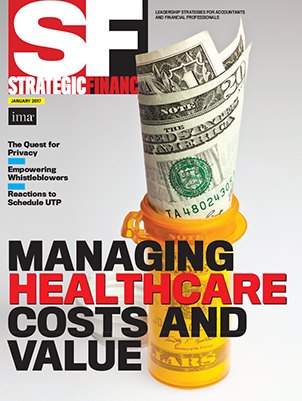As the new year begins, it seems appropriate to look back over the more than 17 years and 200 ethics articles I’ve published in Strategic Finance to see whether ethics topics have changed drastically over the years or have stayed basically the same. For example, the article “Whom Can You Trust?” from the March 2007 issue is as relevant today as the day it was published.
In 2007, the world was in the midst of a housing price bubble that would soon lead to a crisis that brought the global financial community to its knees and required a massive government bailout. Thought leaders believe one of the principal causes of the slow pace and tepid nature of the following recovery was a lack of trust in financial institutions.
Trust is the most basic human condition in both business and society as a whole. Without it, humans wouldn’t be able to live and work together in communities, and business couldn’t take place without each party trusting that the other party would fulfill its expected responsibilities. The March 2007 column examined some of the connections between ethics and trust, and the message still resonates today.
ETHICS AS A CATALYST OF TRUST
A group headed by the Arthur W. Page Society set forth three concepts essential to restoring and maintaining trust in corporations among their customers, investors, employees, and the general public:
- “Articulate a set of ethical principles that are closely connected to core values and business processes and supported with deep management commitment and enterprise wide discipline.” It’s important that the verbal expression of an organization’s ethical principles be intertwined with its actual business processes. Senior management must set the ethical tone throughout the organization.
- “Create a process for transparency and disclosure that is appropriate for the company and industry in both current and future operations and that includes a senior oversight committee, ‘culture’ audits, and consistent messaging.” An emphasis on appropriate reporting of financial and other matters is essential to a strong ethical reputation.
- “Make trust and ethics a board level corporate governance issue, and establish a formal system of measuring trust that touches all parts of the organization.” Regularly evaluating the status of every key organizational goal is important. A scorecard of action steps measuring progress in each area provides a checklist for companies to determine where they stand on each issue.
In 2007, the Page Society also surveyed the CEOs of 23 leading U.S. companies that subscribed to the principles for integrity that Arthur Page articulated 70 or so years ago: Tell the truth; prove it with action; listen to the customer; manage for tomorrow; conduct public relations as if the whole company depends on it; remember that a company’s true character is expressed by its people; and remain calm, patient, and good humored.
More recently, the Society developed the Page Model, which begins with the concept of “Corporate Character,” the definition and alignment of mission, purpose, values, culture, business model, strategy, operations, and brand to create the unique, differentiating identity for an organization. The Society believes “an organization must authentically embody that character in every interaction in order to be deserving of trust.”
THE SPEED OF TRUST
In 2007, Stephen M.R. Covey’s The Speed of Trust: The One Thing that Changes Everything set forth examples of how important trust is to business. Covey believes that trust “has become the key leadership competency of the new global economy” and makes the case that trust is a measurable accelerator to performance. When trust goes up, speed goes up and costs come down. High trust in a company materially improves communication, collaboration, execution, innovation, strategy, engagement, partnering, and relationships with all stakeholders.
Covey also quotes individuals such as James E. Burke, former chairman and CEO of Johnson & Johnson, who said, “Trust is absolutely key to long-term success,” and Thomas L. Friedman, who, in The World Is Flat, wrote, “Without trust, there can also be no flat world, because it’s trust that allows us to take down walls, remove barriers, and eliminate friction at borders. Trust is essential for a flat world.”
THE STATE OF TRUST
Advocacy group Trust Across America—Trust Around the World has published an extensive report, State of Trust in Corporate America 2016. It utilizes the FACTS® Framework, a proprietary measurement and assessment of the “worthiness” or integrity of America’s 2,000 largest companies that includes five indicators of trust and integrity: financial stability, accounting conservativeness, corporate governance, transparency, and sustainability. The report concludes that “When integrity and trust are considered tangible assets and a business imperative, the following results are achieved:
- Decisions are made faster and less expensively.
- Employees are more engaged and retention increases.
- Innovation is higher and occurs more quickly.
- Profitability increases.
In other words, high trust leads to high profitability. It was true in 2007, and it’s true today. That’s why trust is an implicit foundation that underlies the four overarching principles expressing member values of the IMA Statement of Ethical Professional Practice: honesty, fairness, objectivity, and responsibility.
IMA ETHICS HELPLINE
For clarification of how the IMA Statement of Ethical Professional Practice applies to your ethical dilemma, contact the IMA Ethics Helpline.
In the U.S. or Canada, dial (800) 245-1383. In other countries, dial the AT&T USA Direct Access Number from www.usa.att.com/traveler/index.jsp, then the above number.
The IMA Helpline is designed to provide clarification of provisions in the Statement of Ethical Professional Practice, which contains suggestions on how to resolve ethical conflicts. The helpline cannot be considered a hotline to report specific suspected ethical violations.

January 2017



